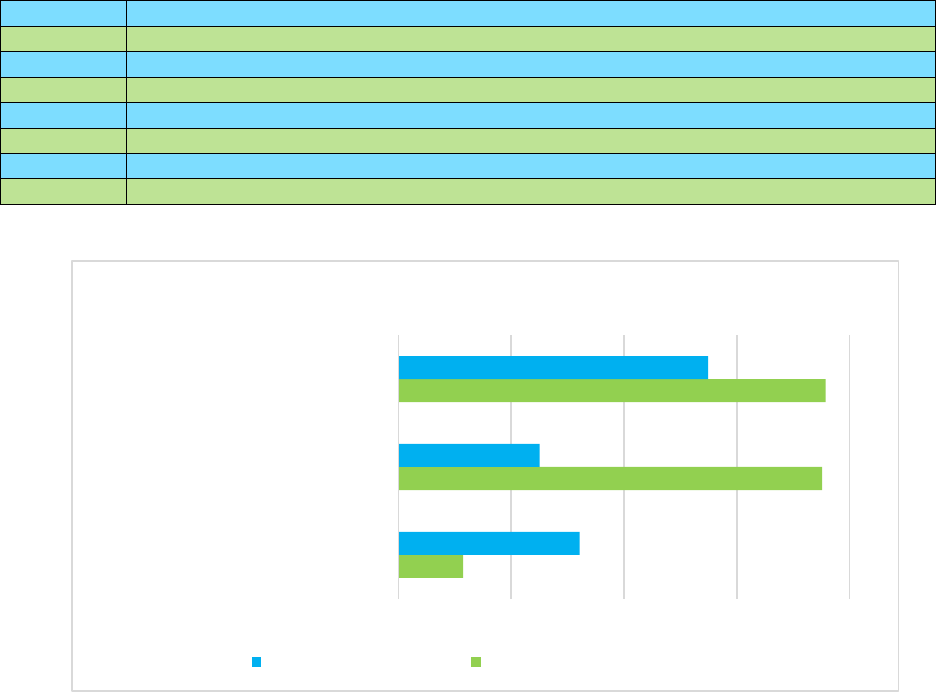
Meals on Wheels of Greater Lynchburg
Volunteer Satisfaction Survey
and
Recipient Survey Summaries
Ei Hlaing, Ph.D., Assistant Professor, University of Lynchburg
Kris Shabestar, Executive Director, Meals on Wheels of Greater Lynchburg
November 30, 2021
Prepared for the Lynchburg Tomorrow, Community-Based Research Initiative

Lynchburg Tomorrow
Community-Based Research Initiative (Pilot) 2021
Nonprofit Community Partner: Meals on Wheels (MOW) of Greater Lynchburg; 605 Clay St.,
Lynchburg VA 24501. 434-847-0796
Team: Ei Hlaing, Ph.D., Department of Psychological Science, hlaing_e@lynchburg.edu
;
Kris Shabestar, Executive Director, Meals on Wheels of Greater Lynchburg
director@mealslynchburg.org
Organizational Structure and Operations:
Meals on Wheels of Greater Lynchburg is a 501(c)3 nonprofit organization that began operation in
1974. Meals on Wheels serves the homebound who are unable to prepare a nutritionally appropriate
meal (and have no one to do that for them). Service may be for either an extended or short period
of time, for individuals with either permanent or temporary disabilities, regardless of age or income.
Five days a week (Monday through Friday) fresh hot lunches are delivered by volunteers over 41
routes which cover the City of Lynchburg, and into the surrounding Amherst, Bedford and Campbell
counties. Meals on Wheels nourishes body and spirit and fosters recipients’ independence by
including a reassuring wellness “check-in” when meals are delivered to those who live alone. Any
unanswered delivery is reported and investigated.
● What are the demographics of those served?
MOW serves people of all ages and incomes. See
overview for 2020 and for 2021 (data updated
January 2022). Approximately 80% of the people served receive their meals at no charge to
them; 8-12% pay the full amount. Between 8-10% are charged on a sliding scale, based on ability
to pay.
● What is the organization’s Model of Funding?
Meals on Wheels does not rely on state or federal funding. Approximately 50% of funding is
from individuals in the community; 11% from the program fees; 11% from events; 12% from
Investment & other income; 8% from grants, and 8% from faith communities.
● What is the organization’s definition of success?
o Meals on Wheels America is a national non-profit organization working toward the social,
physical, nutritional, and economic betterment of vulnerable Americans by providing the
tools and information its programs need to make a difference in the lives of others. The two
main goals are to reduce food insecurity and recipients’ isolation.
o Locally, Meals on Wheels of Greater Lynchburg’s goal is to assist the homebound of all ages
to live independently as long as possible.
Two surveys – one for meal recipients and one for volunteers – were developed collaboratively by
the Meals on Wheels staff and the University of Lynchburg professor, Dr. Ei Hlaing, through the
Lynchburg Tomorrow’s Community-Based Research program. 113 meal recipients and 155 volunteers
completed surveys over the period from mid-August through October, 2021.

The Volunteer Survey
All Volunteers had the option of completing the survey either online or via hard copy. 155 volunteers completed
the survey. The link to the online copy was emailed twice to all volunteers with email addresses on record, and
hard copies were available at meal pickup locations.
The goal in surveying volunteers was to ensure that the volunteer experience reflects the organization’s
Mission and Values.
Volunteers answered 7 questions about their volunteer experience with MOW.
The scale was 1 to 5
1 = do not agree/ terrible
5 = strongly agree/excellent
The average ratings of the question items are as follows:
Mean Standard Deviation
Overall, how would you rate your experience volunteering with Meals
on Wheels?
4.77 0.42
Do you feel you are making a difference in the lives of our Meals on
Wheels recipients by delivering meals?
4.76 0.47
Do you feel that Meals on Wheels delivery protocols and procedures
ensure the health and safety of both volunteers and recipients?
4.71 0.63
Do you feel you receive adequate training and appropriate
communications about your deliveries?
4.47 0.79
Do you feel you are building relationships with our Meals on Wheels
recipients?
4.08 0.94
Do you feel the food you are delivering is appealing? 3.90 0.86
Do you feel our recipients look stronger and healthier over time
after receiving Meals on Wheels deliveries?
3.48 0.94
The second portion of the Volunteer Survey addressed the ‘intangibles’ of delivering more than a
meal in this way:
At Meals on Wheels, we deliver more than a meal.
This sentiment reflects the fact that once MOW volunteers develop relationships with the recipients they
serve, they routinely go above and beyond what is required or expected. Volunteers selected from a list of
known relational activities (could select all that apply) and could also add their own examples.

Ninety-two percent (92%) of the volunteers reported they have additional interactions with the recipients in
addition to the meal delivery. Of the 142 volunteers reporting, activities included:
79% reported they learned a memorable tidbit about the recipient or their family that helped them feel
closer to the recipient,
68% have brought in the mail or paper
56% have asked about a doctor’s visit, trip, or recipient’s family member, or sent cards or notes to the
recipient
32% have taken out trash for the recipient
32% have sent cards or notes to a recipient
30% have opened a can, jar, or a package
21% picked ‘other,’ which included having conversations about difficulties of life, especially aging and
dependence, medical conditions, living conditions, changed a lightbulb, replaced a battery in a clock,
helped place calls, shared an extra meal with someone, followed up on something the recipient said
previously, cut weeds and removed debris from the yard, asked for a welfare check just out of
concern, prayed with them, called office for support when no one answered, then called 911, taking
a lawn chair by as a gift, doing little everyday-things for them that they cannot do for themselves.
Volunteers were also given the opportunity to ‘list one or two of the things they liked most and liked least’
about volunteering.
Liked Most About Volunteering
Building Relationships
Getting to know the
Recipients
- 72
Responses Included: I enjoy getting to know our clients, most of whom I would
never have met without MOW; I enjoy how they smile and are so glad to see me
after they get to recognize me; I have met many interesting individuals; The daily
interaction with a MOW volunteer, though brief, is important to many; I look
forward to the contact and seeing the smiles of the recipients; They have become
part of my life; It is close to my neighborhood so I feel more connected with nearby
neighbors that I would not ordinarily know; Seeing the smiles on faces when they
open the door; We develop a real friendship; The recipients always seem happy to
see us.
Showing love/caring
Making a difference
Alleviating hunger
Feeling useful/helpful
Makes me feel good
- 68
This makes a difference in someone's day; The recipients bring as much joy into my
life as I do theirs; Helping those that really appreciate it; Serving the community
with my husband - it's the one thing we do together as volunteers; I feel needed;
Giving back to the community for my blessings; It is a vital service to the community;
MOW is a bright spot during my week and helps me put things in perspective; A real
and tangible way to make a difference for someone; Providing much-needed
nutrition to those that might not otherwise receive it; Sense of helping those who
cannot help themselves.
Organized, Easy, Quick
I love how organized the route is; Being a substitute means we can fit it into our
schedule easily; participating in a very worthy effort run by and efficient and caring
organization; Simple, organized, and safe; Regular commitment and not overly long
each delivery.
Other Comments
Able to take children; All of it; Seeing parts of town; Humbles me for what I have;
Sharing our MOW adventures with friends; Being part of such a great team of
people.

Liked Least About Volunteering
Concern for Recipients
- 25
Responses included: Hearing bad news about those we deliver to. Having
our route changed so we don’t deliver to old friends (however the flip side is
that we get to meet new ones!); Losing a client from your list; Seeing that
some of the recipients are not doing well; Seeing the clients decline over
time; Wishing I could spend more time with them.
Directions, mapping,
finding new addresses,
Not enough time to visit,
errors
- 23
Driving to unfamiliar areas; getting lost; Occasional lack of clear house
identification on new clients homes; Difficult road conditions and location
and safe access; Routes too long; Poor directions; Some street hard to
manipulate; Hard to read directions while delivering; Steps and hillsides
became difficult; Muddy yards; Questionable locations.
Weather, Masks, Covid
- 20
Covid restrictions which make visits shorter; miss seeing the folks who now
use a cooler for their safety; rainy days, but we always manage no matter
what the weather is; when the temperature is above 95 degrees.
Poor living conditions of
recipients
- 10
Responses: It hurts me to see the disabilities, pains, poverty of many of my
recipients; Sad to see recipients reach the stage when they need more than a
meal and a smile to be able to remain in their homes, but heartwarming to
feel we lengthened their stay at home time; Level of poverty in Lynchburg;
Seeing the way people have to live; Seeing living conditions of clients.
No complaints, love it,
nothing
- 8
I do not dislike any part of it; I enjoy every aspect of this; Nothing - it is well
organized, well-run and it's great to be involved in this ministry; That I can't
do it more often; We enjoy everything about volunteering.
Food quality, odor
- 4
Sometimes the food smells up the back of my car (broccoli); I wish we were
able to provide more fresh fruit and vegetables, more nutrient rich meals;
Seeing the food quality; sometimes the smell of the food isn't great.
Other
- 4
Price of gas; Dogs; No recycling - too much waste; Would like to do more.

The Recipient Survey
Meals on Wheels identified recipients who had the mental acuity and physical ability to respond to survey
questions. Communication was sent to each recipient in advance, informing them of our process and showing
the questions they would be asked, allowing time to process and formulate their responses prior to our phone
call. Student Interns from University of Lynchburg called each recipient and administered the survey via
phone. 133 recipients were willing to participate in the survey.
The goal in surveying recipients was to determine if we are, in fact, fulfilling our Mission of addressing the
unique needs of the homebound community by delivering hot, healthy meals, friendly visits, and safety checks
– empowering people to live valued, independent lives at home. We wanted to assess overall recipient
satisfaction, food security and access, and connection to the volunteer/community.
Responses were as follows:
97%
Feel that the MOW volunteer cares about their health and safety
96%
Are satisfied with the quality of meals
95%
Look forward to seeing and talking with the Meals on Wheels volunteer each day
90%
Have made good friends with the volunteers who deliver their meals
88%
Regularly see volunteers (does not leave coolers on a daily basis)
88%
Feel safer in their home knowing that a volunteer from Meals on Wheels will be stopping by
87%
States it is not inconvenient to answer the door when the volunteer knocks
85%
Feel better, healthier, or stronger since receiving Meals on Wheels
In addition, Meals on Wheels desired to determine a comparison for new recipients. We have incorporated the
same questions into our on-boarding process, and will check back with recipients after 30, 60, and 90 days of
service to validate our assertion that healthy meals do improve the quality of life, and a daily check-in reduces
feelings of isolation and creates a connection in the community.
0.0% 25.0% 50.0% 75.0% 100.0%
Concerned about having enough to eat
Able to acquire healthy food
Have healthy food that is right for me
Food Security and Access
Before Receiving MOW After Receiving Meals on Wheels
What Next?
While these results indicate a high level of satisfaction among both recipients and volunteers, Meals
on Wheels remains committed to continuous improvements, thereby ensuring that recipients receive
seamless services, and the Volunteer Delivery Experience is the absolute best around.
As stated previously, Meals on Wheels has incorporated a number of the same questions into our
recipient on-boarding process, and will check back with recipients after 30, 60, and 90 days of service
to validate our assertion that healthy meals do improve the quality of life, and a daily check-in
reduces feelings of isolation. This will also improve our understanding of the needs of the recipients
and build connection to the program staff.
A Volunteer Information Session is planned for winter/spring 2022 to review these results, update
volunteers on planned improvements and changes, and address any additional questions that arise.
